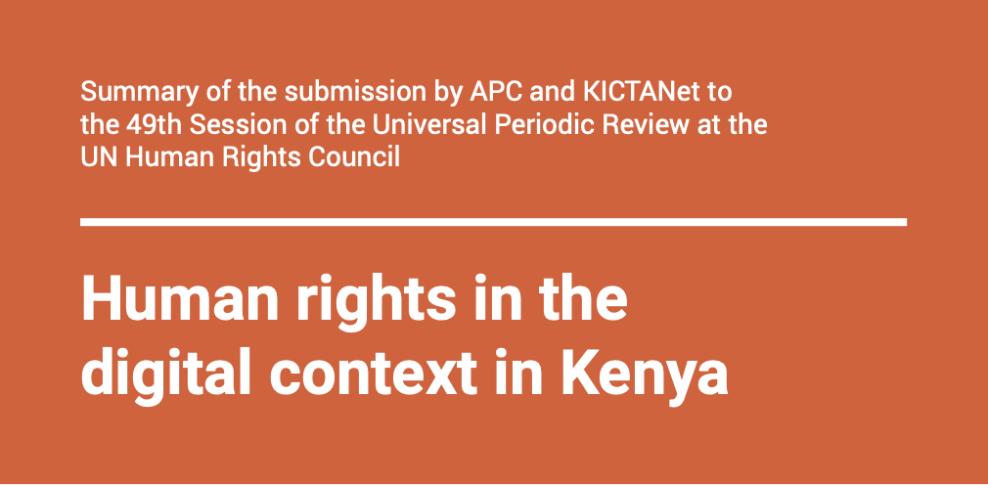
The joint stakeholder report by the Association for Progressive Communications (APC) and Kenya ICT Action Network (KICTANet) focuses on key issues relating to human rights in the digital context in Kenya, including digital connectivity and inclusion, freedom of expression online and technology-facilitated gender-based violence, particularly its impact on human and women’s rights defenders.
Context of the human rights situation online in Kenya
Since its Universal Periodic Review (UPR) during the third cycle, Kenya has made progress towards implementing some of the recommendations received. The Kenya Data Protection Act 2019 was enacted and came into effect in November 2019, with progress towards implementation beginning in 2020. However, hate speech and information manipulation circulating online before and after the August 2022 general elections contributed to Freedom House lowering Kenya’s Freedom on the Net rating in 2023, rating it as “Partly Free” with a score of 66/100. The context of human rights online in Kenya has also been adversely affected in 2024 by the government’s response to the recent public protests to #RejectFinanceBill2024, including widespread crackdown on protestors.
Digital access and inclusion
In 2024, Kenya’s internet penetration was estimated to be 56.03%. Digital access is also affected by the digital gender divide – only 39% of Kenyan women have access to the internet, compared to 59% of men. The digital gender divide is also manifested in the poor representation of women in information and communications technology (ICT) courses and digital technology jobs. There are also significant digital divides affecting access to the internet by marginalised groups, including persons with disabilities and persons in rural areas, exacerbated by the prohibitively high cost of internet access.
Freedom of expression online
Kenyan laws continue to contain provisions which unduly restrict free speech and expression online, including provisions of the Computer Misuse and Cybercrimes Act, 2018 relating to publication of false information online. Similar provisions restricting free speech such as offences of “subversion” and publication of “false information” under the Penal Code have been struck down as unconstitutional by the High Court of Kenya.
Meanwhile, troubling incidents of arrests, intimidation, abduction and killings of journalists and human rights defenders for exercising their rights to free speech continue to be reported. Concerningly, the Kenyan government is in fact introducing new legislation to further criminalise online speech and assembly, such as: (i) a bill to amend the Cybercrimes Act which would expand the offence of cyber harassment; (ii) the Kenya Assembly and Demonstrations Bill, which seeks to regulate assemblies using vague grounds of “public safety” and “public order” and (iii) the Public Fundraising Appeals Bill, 2024 which aims to restrict public fundraising, including online fundraising by requiring permits for such fundraising activities.
Though Kenya does not have a history of shutting down the internet, the country experienced one of its first internet shutdowns in November 2023, when the government blocked Telegram for a week during national examinations. This was followed by widespread outages of internet service on 25 June 2024, during the public protests against the Finance Bill 2024.
Right to privacy, data protection and surveillance
Though the Data Protection Act 2019 was put in place to protect users’ data, certain exceptions are provided for under the law, as well as under the Preservation of Public Security Act and the Official Secrets Act, allowing monitoring of data online and surveillance by the government under broad grounds, including national security or public interest. The use of surveillance technology by the government to monitor individuals and their activities both online and offline has been enabled by mass data collection programmes such as the Maisha Namba digital ID programme, as well as sharing of data by telecommunications providers like Safaricom. Permissive laws combined with weak oversight of state surveillance practices have allowed unchecked surveillance by agencies with little accountability, with documented use of such surveillance to target human rights defenders.
Technology-facilitated gender-based violence (TFGBV)
KICTANet’s research drawing respondents from both urban and rural areas indicates that 54% of the respondents who took part in the survey had experienced TFGBV, with women being disproportionately affected. Prevalent forms of TFGBV in Kenya include trolling, cyberbullying, cyber harassment, non-consensual sharing of intimate images, doxxing, body shaming and gendered disinformation and misinformation. Facebook and WhatsApp recorded the highest percentages of prevalence of TFGBV, with rates of 69.4% and 55.6% respectively. Lack of adequate provisions in Kenya’s laws relating to TFGBV, combined with practical barriers such as low capacity of law enforcement and other stakeholders and lack of accountability for social media platforms, means survivors of TFGBV struggle to access remedies.
Key recommendations to the government of Kenya
- Ensure that digital access is inclusive and equitable for all, including by removing access barriers for marginalised communities, including rural communities, women and persons with disabilities.
- Refrain from network disruptions while strengthening internet infrastructure and multistakeholder, participatory, inclusive and transparent internet governance.
- Amend the Computer Misuse and Cybercrimes Act and repeal provisions criminalising online speech contained in sections 22, 23 and 27.
- Withdraw all cases against individuals facing harassment, intimidation and prosecution from state authorities for legitimate expression and dissent against the government.
- Amend regulatory provisions that permit state surveillance of online content without adequate safeguards.
- Guarantee adequate and independent oversight mechanisms over state surveillance practices to ensure they are limited and proportional in accordance with international human rights standards
- Adopt legal measures and policies to prohibit, investigate and prosecute TFGBV and develop appropriate and effective mechanisms of accountability for social media platforms and other technology companies focused on ensuring company transparency and remediation.